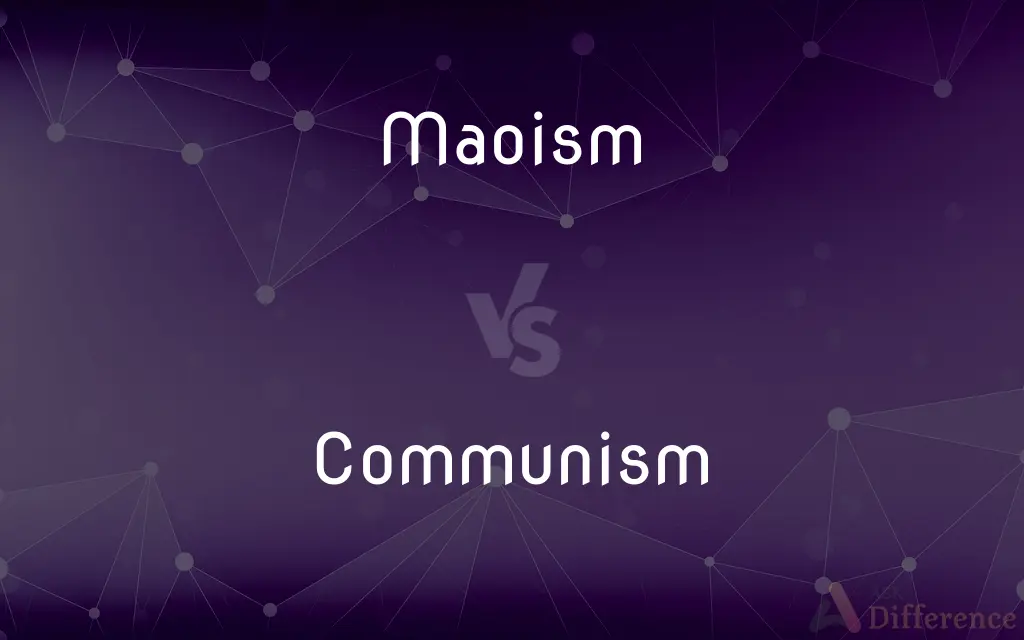Maoism vs. Communism — What's the Difference?
By Tayyaba Rehman & Urooj Arif — Updated on March 25, 2024
Maoism is a form of communism based on the teachings of Mao Zedong, focusing on agrarian peasantry as the revolutionary class, while communism is a broader ideology advocating for a classless society through collective ownership of property.

Difference Between Maoism and Communism
Table of Contents
ADVERTISEMENT
Key Differences
Communism, as a political and economic ideology, envisions a classless, stateless society where the means of production are owned collectively. This theory is most closely associated with Karl Marx and Friedrich Engels, who argued that societal change would come through class struggle, culminating in a proletarian revolution. Maoism, on the other hand, is a variant of Marxism-Leninism adapted by Mao Zedong, emphasizing the role of the peasantry, cultural revolution, and continuous revolution to achieve and maintain a socialist state.
While traditional communism emphasizes industrial workers (proletariat) as the main force behind the revolution, Maoism diverges by highlighting the peasantry's central role in achieving revolutionary goals, especially relevant in the predominantly agrarian Chinese context. Maoism introduces the concept of a "people's war," utilizing guerrilla warfare tactics by the rural peasantry against imperialist forces and domestic oppressors.
Maoism also stresses the importance of the Cultural Revolution, a movement to preserve Chinese communism by purging remnants of capitalist and traditional elements from Chinese society, and to re-impose Maoist thought as the dominant ideology. In contrast, traditional communism does not specify such methods for maintaining a communist society, focusing more broadly on workers' control over production and the abolition of private property.
The international impact of Maoism has been significant, inspiring revolutionary movements in countries like Nepal, Peru, and India, where rural conditions are similar to those in China during Mao's rise to power. Conversely, communism, in its more general form, has influenced a wide range of countries across the world, each adapting the ideology to their specific historical and social conditions.
Comparison Chart
Key Figure
Mao Zedong
Karl Marx, Friedrich Engels
ADVERTISEMENT
Revolutionary Class
Peasantry
Proletariat (industrial workers)
Strategy
People's war, cultural revolution, continuous revolution
Proletarian revolution, class struggle
Focus
Agrarian reform, anti-imperialism
Abolition of private property, classless society
Implementation
Adapted to Chinese society and conditions
Applied in various forms globally
Historical Context
China, mid-20th century
Europe, 19th century
Global Influence
Influential in rural, agrarian societies
Broad influence across industrialized and non-industrialized countries
Compare with Definitions
Maoism
Focuses on cultural revolution:
Mao Zedong initiated the Cultural Revolution to enforce communist ideals.
Communism
Stresses collective ownership of the means of production:
In communism, industries and resources are owned and managed by the community.
Maoism
A form of communism emphasizing the revolutionary potential of peasantry:
Maoism guided the Chinese Revolution, leading to the establishment of the People's Republic of China.
Communism
Envisions a stateless, classless society:
Communism ultimately aims for a society where state apparatuses dissolve, ensuring equality and freedom for all.
Maoism
Advocates for continuous revolution:
Maoism insists on the necessity of ongoing revolution to prevent the restoration of capitalism.
Communism
A socio-economic ideology aiming for a classless society:
Communism has inspired various movements worldwide seeking to abolish capitalism.
Maoism
Maoism, or Mao Zedong Thought (Chinese: 毛泽东思想; pinyin: Máo Zédōng sīxiǎng), is a variety of Marxism–Leninism that Mao Zedong developed for realising a socialist revolution in the agricultural, pre-industrial society of the Republic of China and later the People's Republic of China. The philosophical difference between Maoism and traditional Marxism–Leninism is that the peasantry are the revolutionary vanguard in pre-industrial societies rather than the proletariat.
Communism
Communism (from Latin communis, 'common, universal') is a philosophical, social, political, and economic ideology and movement whose ultimate goal is the establishment of a communist society, namely a socioeconomic order structured upon the ideas of common ownership of the means of production and the absence of social classes, money, and, in some cases, the state. As such, communism is a specific form of socialism.
Maoism
The form of Marxism-Leninism developed in China chiefly by Mao Zedong.
Communism
A theoretical economic system characterized by the collective ownership of property and by the organization of labor for the common advantage of all members.
Maoism
A form of communism developed in China by Mao Zedong.
Communism
A system of government in which the state plans and controls the economy and a single, often authoritarian party holds power, claiming to make progress toward a higher social order in which all goods are equally shared by the people.
Maoism
A form of communism developed in China by Mao Zedong
Communism
The Marxist-Leninist doctrine advocating revolution to overthrow the capitalist system and establish a dictatorship of the proletariat that will eventually evolve into a perfectly egalitarian and communal society.
Communism
Any far-left political ideology or philosophy advocating holding the production of resources collectively, especially by seizing it through revolution.
Communism
Any political social system that implements a communist political philosophy.
Communism
The international socialist society where classes, money, and the state no longer exist.
Communism
A scheme of equalizing the social conditions of life; specifically, a scheme which contemplates the abolition of inequalities in the possession of property, as by distributing all wealth equally to all, or by holding all wealth in common for the equal use and advantage of all.
Communism
A form of socialism that abolishes private ownership
Communism
A political theory favoring collectivism in a classless society
Common Curiosities
How does Maoism differ from communism?
Maoism specifically focuses on the peasantry as the primary revolutionary force and employs unique strategies like the people's war and cultural revolution, while communism broadly seeks a classless society through proletarian leadership.
What is Maoism?
Maoism is a communist ideology developed by Mao Zedong, emphasizing the revolutionary role of the peasantry and the importance of cultural and continuous revolutions.
Why does Maoism focus on the peasantry instead of the proletariat?
Mao adapted Marxism-Leninism to Chinese conditions, where the majority were peasants rather than industrial workers, making them the main force for revolution.
What is the Cultural Revolution in the context of Maoism?
It was a socio-political movement initiated by Mao to enforce communist ideology by removing capitalist, traditional, and cultural elements from Chinese society.
How do Maoism and traditional communism view class struggle?
Both view class struggle as central to societal transformation, but Maoism places a greater emphasis on agrarian class struggles, while traditional communism focuses on urban proletarian movements.
Can Maoism be applied outside of China?
Yes, Maoism has been influential in various rural and agrarian societies around the world, where conditions are conducive to guerrilla warfare and peasant-led revolutions.
Are there countries that still follow Maoist principles today?
Several countries and movements continue to be inspired by Maoist principles, particularly in parts of Asia and Latin America.
How did Maoism impact global revolutionary movements?
Maoism's strategies and emphasis on peasant-led revolutions have influenced numerous liberation and revolutionary movements in countries with similar socio-economic conditions to those of pre-revolutionary China.
Is communism only related to Marx and Engels?
While Karl Marx and Friedrich Engels laid the foundational theories of communism, the ideology has evolved and been adapted in various forms across different contexts globally.
Did Maoism succeed in creating a communist society in China?
Maoism significantly reshaped Chinese society and governance, establishing a socialist state with many communist characteristics, though with unique adaptations specific to China.
Share Your Discovery

Previous Comparison
Trigger vs. Procedure
Next Comparison
Coherent vs. LucidAuthor Spotlight
Written by
Tayyaba RehmanTayyaba Rehman is a distinguished writer, currently serving as a primary contributor to askdifference.com. As a researcher in semantics and etymology, Tayyaba's passion for the complexity of languages and their distinctions has found a perfect home on the platform. Tayyaba delves into the intricacies of language, distinguishing between commonly confused words and phrases, thereby providing clarity for readers worldwide.
Co-written by
Urooj ArifUrooj is a skilled content writer at Ask Difference, known for her exceptional ability to simplify complex topics into engaging and informative content. With a passion for research and a flair for clear, concise writing, she consistently delivers articles that resonate with our diverse audience.














































